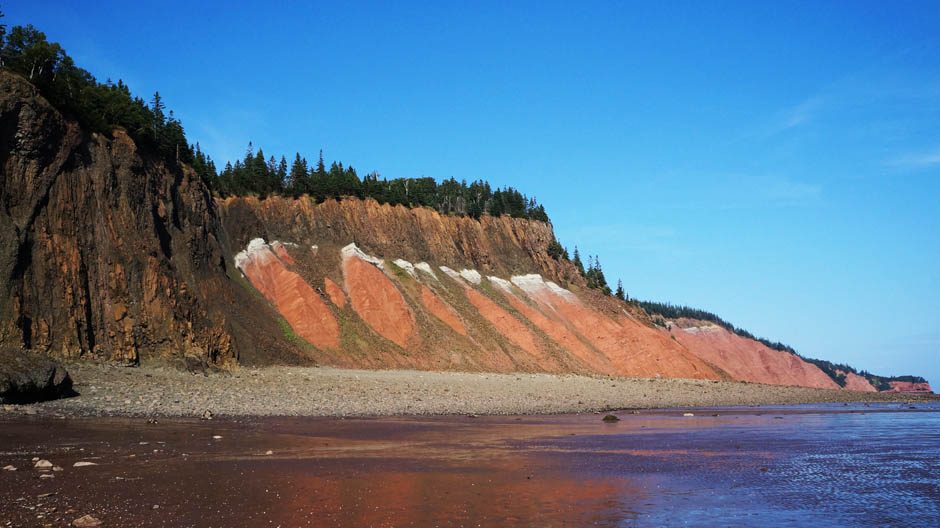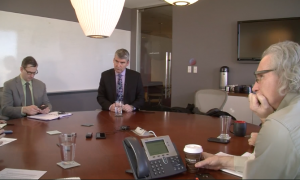– Trade government investment, and NAFTA – Marijuana legislation – Forestry – Conduct in the media.
View VIDEO: McNeil sits down to talk health care, environment, forestry Chronicle Herald, Dec 21, 2017.
Jim Vibert’s assessment of the Premier’s views in today’s CH, which I read after making an abbreviated transcript of the Forestry section of the interview (below), rings true.
He is a man in search of a neutral shade of grey in a world of stark black-and-white politics. He wants answers that make sense but his command of detail betrays a decision-maker who turns each one inside out, making it ever more difficult to determine which side is up.
Nova Scotia’s premier wades into the fray and whales away, not so much to beat it but to battle each dilemma to a reasonable draw. An outcome no one likes, but most can live with.
View VIBERT: Premier’s pragmatism cedes comfort of ideology
Jim Vibert in Chronicle Herald, Dec 21, 2017
So perhaps that is the best we can expect from the “Independent Review”. A neutral shade of grey.
Abbreviated Transcript of the Chronicle Herald Interview with Premier McNeil, Forestry section
Question: It’s [forestry] an issue that has gone on longer than the doctor shortage… various reports through the years that were supposed to set a blueprint for the way forward and we’re still getting the same debates. Now there is another report coming shortly from Mr. Lahey. Can you talk about what you are hoping that will provide; there is a lot of disbelief out there that these reports change anything; there is a lot of frustration about what is happening in the forest.
McNeil: … this is another one of those issues that depending on which side you are talking to, they are so far apart, the great divide is between them…. I wanted an independent analysis of it. I come from a part of the province where there is a tremendous amount of activity happening today in our forests, yet I have private woodlot owners telling me they can’t sell their fibre, yet there is a lot of activity on Crown land.
So the question for me is.. how is that happening? On one side I get an answer and on the other side I get another answer. So I went out looking for an independent review to not only address what’s happening in the western part of the province but in the whole province.
Forestry is an important part of how we drive the economy of our province, there’s a balance to make sure we are doing it in a sustainable way and that’s what I am hoping will come from this report.
It [forestry] too has changed a lot. It wasn’t all that long ago when we had three mills going at full tilt. We now in essence are really trying to shift to a sawmill entry point so we get the maximum value out of that piece of fibre; that should be our entry point into that industry, and then the by-product whether it’s biomass or pulp.. how do we do that?
The other coordination that will be required I think… you have people going in on Crown or private land, more on Crown where they are looking for a particular type of fibre and in the process they are taking it all… how do we create a system that allows you to sort and separate and put the fibre through the right part of our system as opposed to in some cases leaving it on the ground and then coordinate that though the mills and then the private guys who are out there working.
I am looking forward for the Lahey Report coming in…
Question: Is there a commitment on the front end to adopting these recommendations. We had the Porter, Fuller[?] Bancroft report, there were some recommendations that appeared to be adopted and then the dissenting panelist was hired by government and some of those seemed to be put on hold or reversed.., that goes to your point of sometimes having two camps and you want to make sure whatever decision you come to you have the basis of legitimacy. There have been questions asked based on that history… I am wondering how you will treat what comes from Lahey… can you make a commitment on the front end that it will be treated in a certain fashion?
McNeil: …I asked him to do this work because I need a sustainable path forward… my intention is to implement the recommendations he brings forward. I only know him through his work, he has always delivered what has been a thoughtfulm fact based, science based approach to.. whether it was the aquaculture file he did for us… I believe he will use the same with the forestry file. …
Your lead-in to the question though, I understand how people are feeling and I understand why. There was the Bancroft report and there was a dissenting voice that ends up in government and people are feeling that this thing is tilted one way or the other
… how do we have economic activity yet environmental protection? There are those who think we don’t strike the balance, others who don’t think you can. Well I think you can and I think Mr. Lahey will be able to look at all of the independent points of view and bring us something that makes sense.
On Boat Harbour
We’re continuing down the road, we will meet the legislation that Boat Harbour doesn’t exist in 2020… there has been no final decision about what the treatment plant will look like…I am sure they will be looking at a number of options…it has never been nor will it be my intention to move Boat Harbour. One community had it too long; it was an injustice; if it hadn’t been next to an Aboriginal community it would not have happened …. It has never been our intention to move it and pollute somewhere else or to affect what is the backbone of most of our rural communities which is the fishery..
Question: So you are saying the fishery won’t be affected?
McNeil: …What does the science tell us [about whether treated effluent could affect the fishery].. At some point we have to have some faith in the science base that we are doing.
———-
And suppose the science says… it’s like climate change, the steps leading up to it were incremental, but then a threshold was crossed; no single step, no individual caused climate change as we are seeing it today; we did it collectively. It’s like the cod fishery, no single boat caused the collapse, they all did. Our science tells us that there will be an impact of the effluent going into the Strait, but it will affect the fishery by only 1%… it’s like the 1% of our landscape that we harvest each year for forestry…
And the grey message is “no big deal year to year, Mr. Premier, so why shake things up?”
But who knows, maybe the recommendations coming out of the Independent Review and the EA for the proposed pulp effluent system will surprise us, and the Premier too. I hope so.

